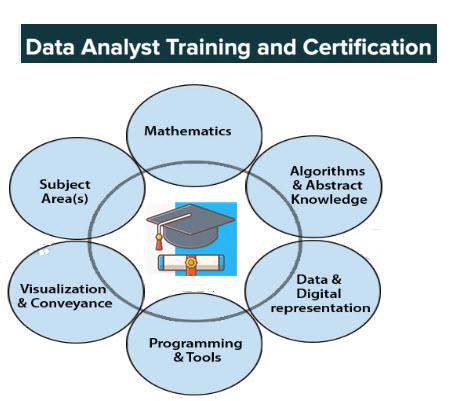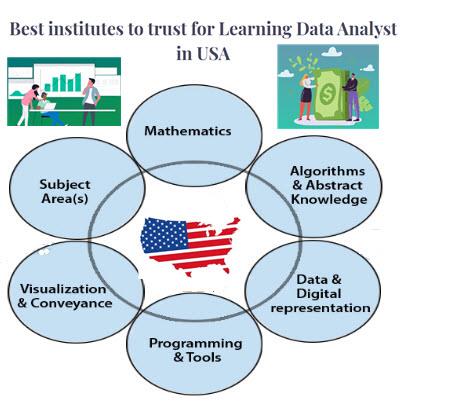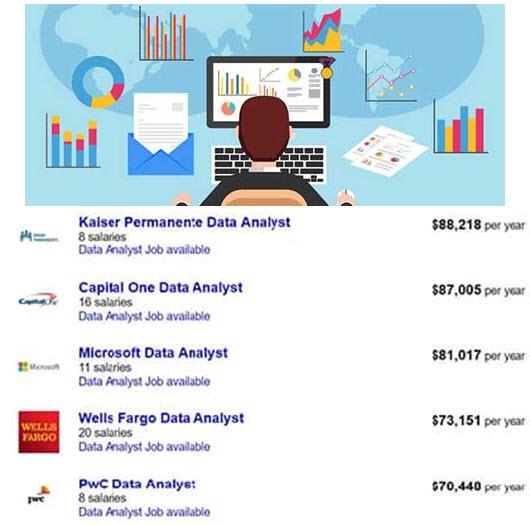How does the Data Analyst syllabus help me to get a job?

The data analyst course syllabus is comprehensive and will help you to become proficient in the subject. You will be a live wire in the job market. Data Analyst course syllabus is prepared for industry-required scenarios and real-time solutions.
1. Probability and Mathematics for Prediction and Solution
A syllabus in data analyst course will have statistics, concepts of probability and mathematics which will help to solve business problems. Statistics and probability concepts will help in data analysis. Linear algebra and multivariate analysis and calculus also help to perform data analysis and data mining.
2. Programming Languages to extract data for Analysis
Knowledge of programming languages like R or Python will help manipulate the data. Knowledge of either or any one of them will help to extract data and manipulate to get the desired results.
3. Database knowledge to pull data from DB
Knowledge of database like SQL will help to store, manipulate and retrieve data. You will also learn to import and export data from the database. Since organizational structured data is huge, a knowledge of SQL will help to work with databases.
4. Querying languages to modify as structured
Thorough knowledge of SQL, Hive or pig will help to create tables, create, maintain and retrieve the relational database. Knowledge of any querying language will help the data analyst to create, access and modify the data (in and out of the database) with the help of a structured command.
5. Statistical languages
Thorough knowledge of statistical languages like R, SAS, SPSS will help in the statistical calculations of the data and in data interpretation.
6. Data visualization tools
Knowledge of data visualization tools like Tableau will help you as a data analyst to visualize and present the data in an understandable way to the stakeholders and the organization’s management to take business decisions. The course will help you to create charts, graphs, customize dashboards, storyboards and present the data.
Find a course provider to learn Data Analyst
Java training | J2EE training | J2EE Jboss training | Apache JMeter trainingTake the next step towards your professional goals in Data Analyst
Don't hesitate to talk with our course advisor right now
Receive a call
Contact NowMake a call
+1-732-338-7323Enroll for the next batch
Data Analytics Courses Training
- Jan 29 2026
- Online
Data Analytics Courses Training
- Jan 30 2026
- Online
Related blogs on Data Analyst to learn more

List of few Data Analyst Certifications - Certificate Name, Exam Duration, Passing Score and Exam Cost
Top 4 data analyst certifications to benefit your career. A Data Analyst certification will fetch multiple benefits to your career. In this page you can find list of data analyst certifications with certificate name, exam duration, no of questions to

What are the best institutes that I should trust to Learn Data Analyst in USA?
There are many good institutes which offers you data analyst course in the USA We have collected a comprehensive list of institutes, courses and its combinations to learn the data analysis skills that prepare you to become an efficient data analyst

Which is the best way to learn the Data analyst course - Online or Offline
A data analyst course can be learnt online or offline. There are many data analysis teaching institutes which offer online courses. They start with the fundamentals and then move up to the advanced mastery levels in data analysis.

How does data analyst certification benefit me?
A data analyst certification will open doors in many industries like E-commerce, market places, health care, finance and banking, entertainment, retail to name a few which leverage the power of data analytics. The skill sets of one industry are usual
Latest blogs on technology to explore

Drug Safety & Pharmacovigilance: Your 2026 Career Passport to a Booming Healthcare Industry!
Why This Course Is the Hottest Ticket for Science Grads & Healthcare Pros (No Lab Coat Required!)" The Exploding Demand for Drug Safety Experts "Did you know? The global pharmacovigilance market is set to hit $12.5B by 2026 (Grand View Research, 202

Launch Your Tech Career: Why Mastering AWS Foundation is Your Golden Ticket in 2026
There’s one skill that can open all those doors — Amazon Web Services (AWS) Foundation

Data Science in 2026: The Hottest Skill of the Decade (And How Sulekha IT Services Helps You Master It!)
Data Science: The Career that’s everywhere—and Nowhere Near Slowing Down "From Netflix recommendations to self-driving cars, data science is the secret sauce behind the tech you use every day. And here’s the kicker: The U.S. alone will have 11.5 mill

Salesforce Admin in 2026: The Career Goldmine You Didn’t Know You Needed (And How to Break In!)
The Salesforce Boom: Why Admins Are in Crazy Demand "Did you know? Salesforce is the 1 CRM platform worldwide, used by 150,000+ companies—including giants like Amazon, Coca-Cola, and Spotify (Salesforce, 2025). And here’s the kicker: Every single one

Python Power: Why 2026 Belongs to Coders Who Think in Python
If the past decade was about learning to code, the next one is about coding smarter. And in 2026, the smartest move for any IT enthusiast is learning Python — the language that powers AI models, automates the web, and drives data decisions across ind

The Tableau Revolution of 2025
"In a world drowning in data, companies aren’t just looking for analysts—they’re hunting for storytellers who can turn numbers into decisions. Enter Tableau, the #1 data visualization tool used by 86% of Fortune 500 companies (Tableau, 2024). Whether

From Student to AI Pro: What Does Prompt Engineering Entail and How Do You Start?
Explore the growing field of prompt engineering, a vital skill for AI enthusiasts. Learn how to craft optimized prompts for tools like ChatGPT and Gemini, and discover the career opportunities and skills needed to succeed in this fast-evolving indust

How Security Classification Guides Strengthen Data Protection in Modern Cybersecurity
A Security Classification Guide (SCG) defines data protection standards, ensuring sensitive information is handled securely across all levels. By outlining confidentiality, access controls, and declassification procedures, SCGs strengthen cybersecuri

Artificial Intelligence – A Growing Field of Study for Modern Learners
Artificial Intelligence is becoming a top study choice due to high job demand and future scope. This blog explains key subjects, career opportunities, and a simple AI study roadmap to help beginners start learning and build a strong career in the AI

Java in 2026: Why This ‘Old’ Language Is Still Your Golden Ticket to a Tech Career (And Where to Learn It!
Think Java is old news? Think again! 90% of Fortune 500 companies (yes, including Google, Amazon, and Netflix) run on Java (Oracle, 2025). From Android apps to banking systems, Java is the backbone of tech—and Sulekha IT Services is your fast track t